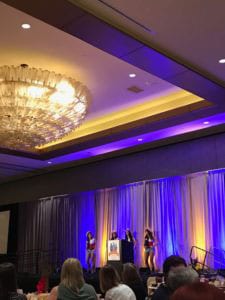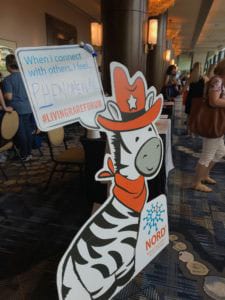The 2019 NORD Living Stronger Forum was held in Houston, TX, at the end of June. The event brought families and physicians from all over for educational presentations, community, and both wellness and Texas themed fun.
 One of the core, reoccurring, themes of the event was the importance of collaboration between patients, researchers, and physicians. Several patients and their doctors shared their perspectives about their relationships. Owen, who lives with Marfan syndrome, reflected back to when he first received his diagnosis and called it “one of the hardest days of his life.” He emphasized that having a doctor who he felt treated him “as a whole person” rather than just a condition, made all the difference. With the support of his physician, Dr. Morris, Owen navigated his teenage years with his new diagnosis and became active within the Marfan community.
One of the core, reoccurring, themes of the event was the importance of collaboration between patients, researchers, and physicians. Several patients and their doctors shared their perspectives about their relationships. Owen, who lives with Marfan syndrome, reflected back to when he first received his diagnosis and called it “one of the hardest days of his life.” He emphasized that having a doctor who he felt treated him “as a whole person” rather than just a condition, made all the difference. With the support of his physician, Dr. Morris, Owen navigated his teenage years with his new diagnosis and became active within the Marfan community.
“The personal connection with my doctor means so much to me. I have a doctor who is going to support me, not just with my condition, but in life.”-Owen explained, as he shared his journey Marfan syndrome
Rising high school student Shauna Sperou shared her story of being diagnosed with Rothmund-Thomson syndrome when she was just one year old, and her close relationship with her far away specialist. Shauna’s specialist, Dr. Wang, created a support group for those with Shauna’s condition, and met her while she was very young. Dr. Wang was interested in learning more about Rothmund-Thomson syndrome while also making sure families felt supported and didn’t feel alone while data was so limited. Today, Shauna has personally contributed to research by participating in multiple studies and she and Dr. Wang are closer than most patients and doctors. They stay in touch and feel like family. That relationship has made a world of difference to Shauna and her family.
“There are a lot of unknowns when it comes to rare diseases….. Having patients who can accept the unknowns alongside us and work together, contributes a great deal to a meaningful team effort. Without that close partnership with our patients and families it would be impossible to find the answers to these questions,” Dr. Wang shared.
Neena Nizar, founder of the Jansen’s Foundation, gave a speech detailing her and her family’s journey and encouraging others not to give up hope. Neena had received multiple incorrect diagnoses. She was told that she would never get married and wouldn’t be able to have children. One husband and two kids later Neena has gotten a diagnosis, created a foundation, and contributed greatly to the advancement of research for her and her sons’ condition. She has worked directly with researchers who, before her, had never met a patient living with Jansen’s.
The breakout sessions for medical professionals echoed similar sentiments regarding collaboration.
Dr. Emrick’s presentation emphasized the importance of listening to parental concerns as well as improving upon phenotyping.
“Ask if the phenotype matches the diagnoses. Improved phenotyping will improve diagnosis and patient care. Genetic diagnosis can improve phenotyping and management,” Dr. Emrick advised.
Dr. Wangler presented several case studies; concluding “Finding genetic causes can suggest therapy. It is difficult to conduct trials and validate therapy in rare disease. Patient registries and social media allow families to quickly gather information for support. Better individual care, research, and each new discovery, can connect families that would otherwise not find one another.
Dr. Wangler also suggested that genomics in combination with social media, can increase “matchmaking” between rare disease families which is “particularly powerful for cases involving de novo mutations.”
Kelly Trout, co-founder and co-chairperson of the International WAGR Syndrome Association gave a presentation that highlighted lessons she has learned through her work with the association, and from her daughter. She emphasized the importance of providers understanding the patient perspective and “the way that patients view their own lives” in addition to being willing to listen and learn from patients and families.
“We don’t need a doctor to have all the answers. We need a doctor who is willing to listen, who can acknowledge that someone who can give them a lot of information about a condition is across from them in the exam room.” -Kelly Trout
Dr. Burrage stressed the necessity of emergency letters for many rare disease families, stating that one copy should be carried at all times and another should be kept in the patient’s chart. Dr. Burrage’s checklist for the letter included: Diagnosis, concerning symptoms, initial steps in evaluation, and contact information for the patient’s genetics team. She encouraged other physicians and medical students to take letters of emergency seriously and not to be shy in asking for assistance when they are evaluating a patient with a genetic disorder.
Dr. Dhar outlined the utility of genetic testing of adults. Genetic testing can confirm a diagnosis, lead to more focused care, and potentially to the discussion of testing family members in addition to assisting in informed family planning.
Dr. Lee provided an overview of the general process of rare disease research, and the aspects which make it difficult. He listed natural history studies, cooperation between various stakeholders, and the repurposing of FDA approved drugs as accelerators of therapeutic development.
Lisa Matesevac shared the goals behind the Foundation for Prader Willi Research’s decision to develop a patient registry. Outlining how it has helped them in developing new endpoints for clinical trials, understanding and developing standards of care, and advancing the understanding of the natural history of PWS.
 The event’s closing panel centered around patient empowerment, and hope. These two quotes by participating physicians will remain with participants for a long time:
The event’s closing panel centered around patient empowerment, and hope. These two quotes by participating physicians will remain with participants for a long time:
“Patients and families drive this field. I learned if I didn’t listen to my rare disease patients, I was pretty stupid. They could teach me things I couldn’t find in books… Your stories are powerful”- Dr. Summer
“I think families are enormously powerful. It’s important to work together. We don’t know the answer and we’re all learning together. When you have a rare disease you’re living the symptoms that will inform the whole field. It has to be a partnership.”- Dr. Lee


